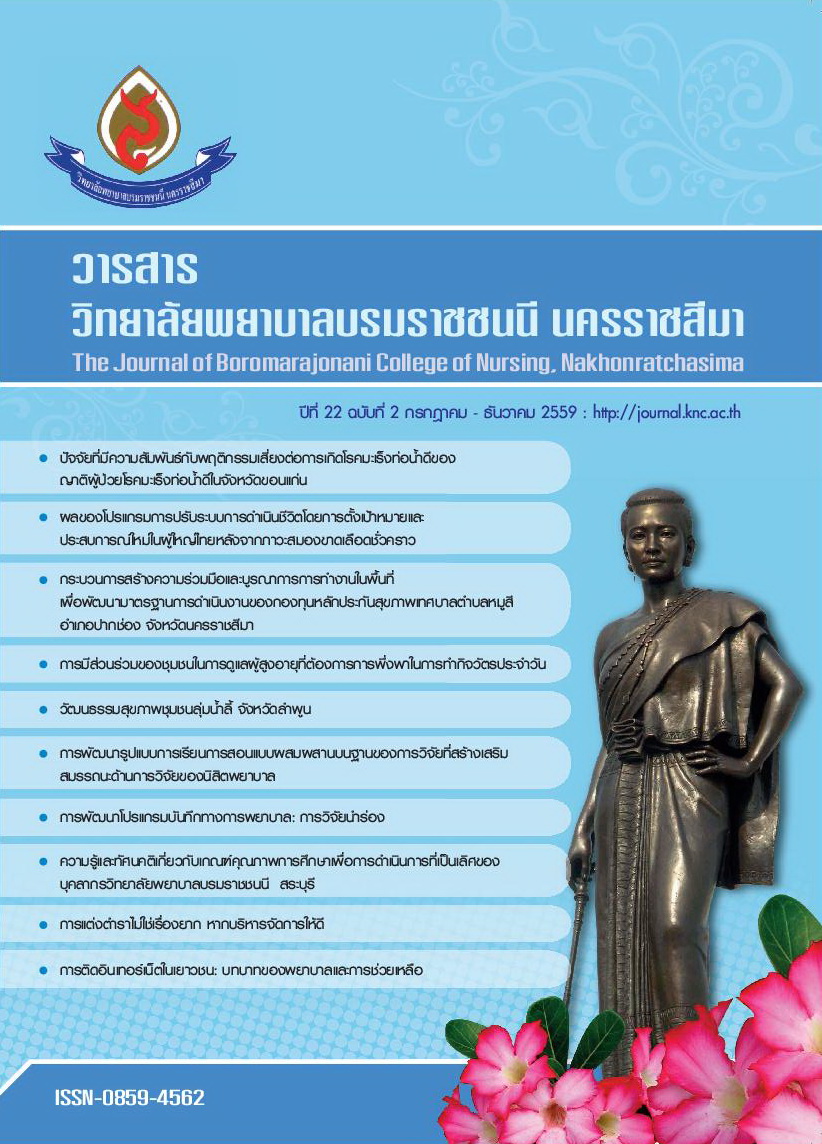ปัจจัยที่มีความสัมพันธ์กับพฤติกรรมเสี่ยงต่อการเกิดโรคมะเร็งท่อนํ้าดีของญาติผู้ป่วยโรคมะเร็งท่อนํ้าดีในจังหวัดขอนแก่น
คำสำคัญ:
พฤติกรรมเสี่ยงต่อการเกิดโรคมะเร็งท่อน้ำดี, ญาติผู้ป่วยโรคมะเร็งท่อน้ำดี, โรคมะเร็งท่อน้ำดี, Risk Behavior of Cholangiocarcinoma, Relatives of Patients with Cholangiocarcinoma, Cholangiocarcinomaบทคัดย่อ
บทคัดย่อ
โรคมะเร็งท่อน้ำดีถือว่าเป็นโรคที่มีความรุนแรงเพราะทำให้สูญเสียค่ารักษาและเสียชีวิตมาก พบมากในแถบประเทศแถบลุ่มแม่น้ำโขงโดยเฉพาะภาคตะวันออกเฉียงเหนือของประเทศไทย ปัจจัยที่สำคัญต่อการเกิดโรคมะเร็งท่อน้ำดีคือการติดเชื้อพยาธิใบไม้ตับ และการติดเชื้อพยาธิใบไม้ตับส่วนใหญ่มาจากการรับประทานอาหารปลาดิบเป็นประจำ โดยการศึกษาครั้งนี้เป็นการศึกษาเชิงวิเคราะห์แบบภาคตัดขวาง มีวัตถุประสงค์เพื่อศึกษาความสัมพันธ์ระหว่าง ปัจจัยนำ ปัจจัยเอื้อ ปัจจัยเสริม กลุ่มตัวอย่างคือญาติผู้ป่วยโรคมะเร็งท่อน้ำดี จำนวน 124 คน รวบรวมข้อมูล โดยใช้แบบสอบถาม และการวิเคราะห์ข้อมูล โดยการหาค่าร้อยละ ค่าเฉลี่ย ส่วนเบี่ยงเบนมาตรฐาน และการวิเคราะห์การถดถอยพหุโลจิสติกส์
ผลการศึกษา พบว่ากลุ่มตัวอย่างส่วนใหญ่มีความรู้เกี่ยวมะเร็งท่อน้ำดีในระดับสูง (ร้อยละ 50.80) มีการรับรู้เกี่ยวกับโรคมะเร็งท่อน้ำดีระดับปานกลาง (ร้อยละ 63.79) มีพฤติกรรมเสี่ยงต่อการเกิดโรคมะเร็งท่อน้ำดีระดับปานกลาง (ร้อยละ 60.48) ปัจจัยที่มีความสัมพันธ์ทางบวกกับพฤติกรรมเสี่ยงต่อการเกิดโรค มะเร็งท่อน้ำดี อย่างมีนัยสำคัญทางสถิติประกอบด้วย สถานภาพสมรส (p-value < 0.01) การตรวจอุจจาระหาไข่พยาธิ (p-value < 0.05) และการรับรู้โอกาสเสี่ยงต่อการเกิดโรคมะเร็งท่อน้ำดี (p-value < 0.01) ซึ่งมีความเสี่ยงมากเป็น 5.51 เท่าของการรับรู้ความรุนแรงของการเกิดโรคมะเร็งท่อน้ำดี การรับรู้ประโยชน์ของการป้องกันโรคมะเร็งท่อน้ำดี และการรับรู้อุปสรรคของการปฏิบัติตัวในการป้องกันโรคมะเร็งท่อน้ำดี ดังนั้นการป้องกันโรคมะเร็งท่อน้ำดีควรเน้นการสร้างการรับรู้โอกาสเสี่ยงต่อการการเกิดโรคมะเร็งท่อน้ำดี
คำสำคัญ: พฤติกรรมเสี่ยงต่อการเกิดโรคมะเร็งท่อน้ำดี, ญาติผู้ป่วยโรคมะเร็งท่อน้ำดี, โรคมะเร็งท่อน้ำดี
Factors Related with Cholangiocarcinoma Risk Behavior of Cholangiocarcinoma Patient’s Relatives in Khonkaen Province
SakchaiKamaro, M.P.H.*
RujiraDuangsong, Ph.D.**
Abstract
Bile duct cancer or cholangiocarcinoma is considered as a severe disease with high financial and mortality impact. It is mostly found in provinces nearby the Khong River especially in northeastern part of Thailand. The main factor for getting cholangiocarcinoma is opisthorchiasis which is caused by consuming undercooked or raw fish. This research was conducted as a cross section analysis form. The purpose of this research was to study the relationship between three main factors and the sample of 124 patients by using questionnaires, calculating three mathematical values – percentages, means and standard deviations and logistic regression analysis.
The results showed that 50.8 percent of the participants had knowledge of cholangiocarcinoma at a good level, 63.79 percent had information about cholangiocarcinoma at normal level and 60.48 percent had risk of being cholangiocarcinoma at high level. The factors which were related to a positive statistical relationship of the cholangiocarcinoma including marital status (p-value < 0.01), stools examination for finding parasite eggs (p-value < 0.05) and knowing the risks of cholangiocarcinoma (p-value < 0.01). The odds of avoiding the disease were much better in the group that had knowledge about symptoms, benefits of cholangiocarcinoma protection and knowing the obstacle of the cholangiocarcinoma protection (ORadj = 5.51). In conclusion, to prevent bile duct cancer, health care providers should emphasize main risk factors to their clients and community.
Keywords: Risk Behavior of Cholangiocarcinoma, Relatives of Patients with Cholangiocarcinoma, Cholangiocarcinoma
ดาวน์โหลด
ฉบับ
ประเภทบทความ
สัญญาอนุญาต
บทความที่ได้รับการตีพิมพ์เป็นลิขสิทธิ์ของ วารสารสุขภาพและการศึกษาพยาบาล ซึ่งดำเนินการโดยวิทยาลัยพยาบาลบรมราชชนนี นครราชสีมา
ข้อความที่ปรากฏในบทความในวารสารเล่มนี้เป็นความคิดเห็นส่วนตัวของผู้เขียนแต่ละท่านไม่เกี่ยวข้องกับกองบรรณาธิการวารสารสุขภาพและการศึกษาพยาบาล หรือวิทยาลัยพยาบาลบรมราชชนนี นครราชสีมา แต่อย่างใด ความรับผิดชอบองค์ประกอบทั้งหมดของบทความแต่ละเรื่องเป็นของผู้เขียนแต่ละท่าน หากมีความผิดพลาดใดๆ ผู้เขียนแต่ละท่านจะรับผิดชอบบทความของตนเองแต่ผู้เดียว







